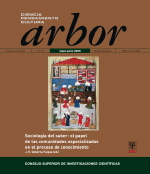Establishing Legitimacy in Rabbinical Knowledge: Angels, Men and Ordinary Asses
DOI:
https://doi.org/10.3989/arbor.2008.i731.193Keywords:
Declive de las generaciones, jurisprudencia rabínica derecho judío, fuentes rabínicas, HalajáAbstract
This article presents an examination of two major working ideas of rabbinical Judaism: a) humankind lives through an endless spiritual decline since the days of our pious forefathers (yĕridat ha-dorot); b) in matters of legal adjudication, the opinion of active legal decisors (posĕqim) is the one and only to be followed, even if divergent from earlier authoritative sources (hilxeta kĕ-vatraˀe). My examination of the nature and present currency of both ideas will be led by the poignant halakhic problem of the agunot (“chained women”). Rather than a thorough epistemology of both ideas, I will favour an argument which highlights the paradox of the link between authority and scholarship in rabbinical Judaism.
Downloads
References
Abel, Yehudah, (2006a): “A critique of Za’aqat Dalot”, Working Papers of the Agunah Research Unit 6, 1-28, URL: http://www.mucjs.org/ZD.pdf.
Abel, Yehudah, (2006b): “Halakhah - majority, seniority, finality and consensus”, Working Papers of the Agunah Research Unit 7, 1-24, URL: http://www.mucjs.org/Consensus.pdf.
Abel, Yehudah (2006c): “The plight of the ‘agunah and conditional marriage”, Working Papers of the Agunah Research Unit 4, 1-41, URL: http://www.mucjs.org/MELILAH/2005/1.pdf (publicado con la misma URL en Melilah, 2005).
Berger, Michael Seth, (1992): The authority of the Babylonian Talmud: analysis of its justifications and a proposal for a contemporary model, Nueva York, Columbia University, tesis inédita.
Elon, Menachem, (1994): Jewish law: history, sources, principles, Filadelfia, Jewish Publication Society, vol. i.
Haas, Peter J., (1996): Responsa: literary history of a rabbinic genre, Atlanta, Scholars Press.
Ibn Ḥabib, Moše ben Šělomo (5619/1859-1860): Sefer ezrat našim, Leipzig, s.n., URL: http://www.hebrewbooks.org/8529.
Jackson, Bernard S., (2004a): “Agunah and the Problem of Authority: Directions for Future Research”, Melilah i, 1-78, URL: http://www.mucjs.org/MELILAH/2004/1.pdf.
Jackson, Bernard S., (2004b): “How Jewish is Jewish family law?”, Journal of Jewish Studies lv, 2, 201-229.
Jackson, Bernard S., (2006a): “Internal and external comparisons of religious law: reflections from Jewish Law”, Journal of Comparative Law I, 1, 177-199.
Jackson, Bernard S., (2006b): “Preliminary Report of the Agunah Research Unit”, Working Papers of the Agunah Research Unit 8, 1-45, URL: http://www.mucjs.org/PrelimRep.pdf.
Josephus, Flavius, (1892): Flavii Iosephi opera, Berlín, Weidmann, edición de B. Niese, URL: http://www.perseus.tufts.edu/cgi-bin/ptext?lookup=J.+AJ+1.1.
Katz, Jacob, (5718/1958): “Af al pi še-ḥaṭa Yiśra el hu”, Tarbiz XXVII, 203-217.
Kellner, Menachem Marc, (1996): Maimonides on the "Decline of the Generations" and the nature of rabbinic authority, Albany, State University of New York Press.
Meyuhas-Ginio, Alisa, (2007): “La actitud de los rabinos sefardíes del Imperio Otomano ante los conversos: el caso del yavam mĕšummad”, en: Koch, Yolanda Moreno (ed.), La mujer judía, Córdoba, El Almendro, 129-148.
Orfali Levi, Moisés, (1982): Los conversos españoles en la literatura rabínica: problemas jurídicos y opiniones legales durante los siglos XII-XVI, Salamanca, Universidad Pontificia de Salamanca, Universidad de Granada, Federación Sefardí de España.
Riera i Sans, Jaume, (1986): “El baptisme de rabí Ishaq ben Seset Perfet”, Calls I, 43-52.
Rustow, Marina, (2004): Rabbanite-Karaite relations in Fatimid Egypt and Syria: a study based on documents from the Cairo Geniza, Nueva York, Columbia University, tesis inédita.
Samely, Alexander, (2007): Forms of rabbinic literature and thought: an introduction, Oxford, Oxford University Press.
Skovmand, Keld, (1994): “Nykristne, conversos, marranos, judaister og anusim; et problem, dets historie og en revurdering af det”, Nordisk Judaistik XV, 1-2, 25-50.
Ta-Shma, Israel Moses, (1998): “The law is in accord with the later authority – ‘hilkhata kebatrai’: historical observations on a legal rule”, en: Ben-Menahem, Hanina y Hecht, Neil S. (eds.), Authority, process and method: Studies in Jewish Law, Amsterdam, Harwood Academic Publishers, 101-128.
Weistreich, Avishalom, (2007): “Compelling a Divorce? Early Talmudic Roots of Coercion in a Case of Moredet”, Working Papers of the Agunah Research Unit 9, 1-19, URL: http://www.mucjs.org/Westreich.pdf
Downloads
Published
How to Cite
Issue
Section
License
Copyright (c) 2008 Consejo Superior de Investigaciones Científicas (CSIC)

This work is licensed under a Creative Commons Attribution 4.0 International License.
© CSIC. Manuscripts published in both the printed and online versions of this Journal are the property of Consejo Superior de Investigaciones Científicas, and quoting this source is a requirement for any partial or full reproduction.All contents of this electronic edition, except where otherwise noted, are distributed under a “Creative Commons Attribution 4.0 International” (CC BY 4.0) License. You may read here the basic information and the legal text of the license. The indication of the CC BY 4.0 License must be expressly stated in this way when necessary.
Self-archiving in repositories, personal webpages or similar, of any version other than the published by the Editor, is not allowed.















